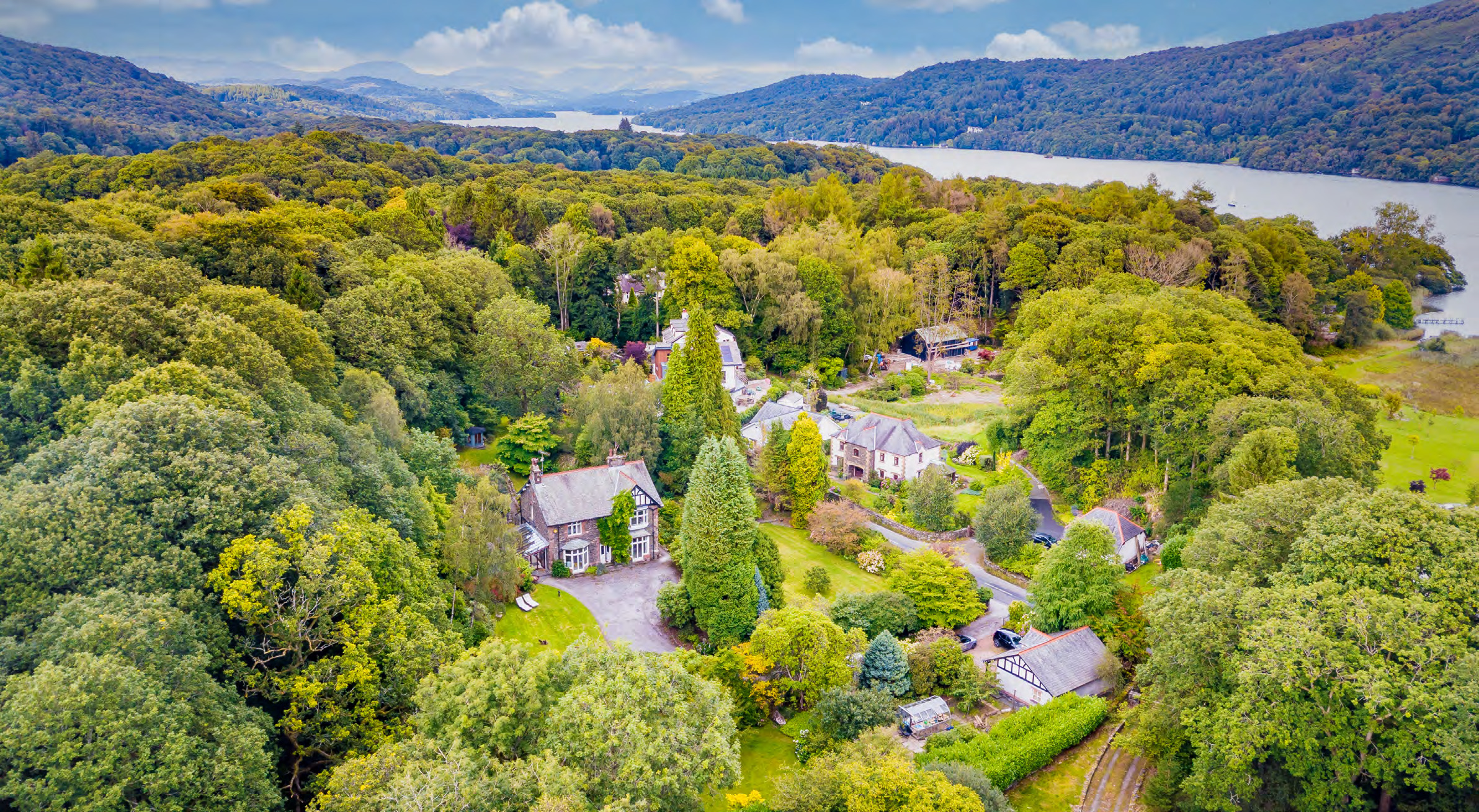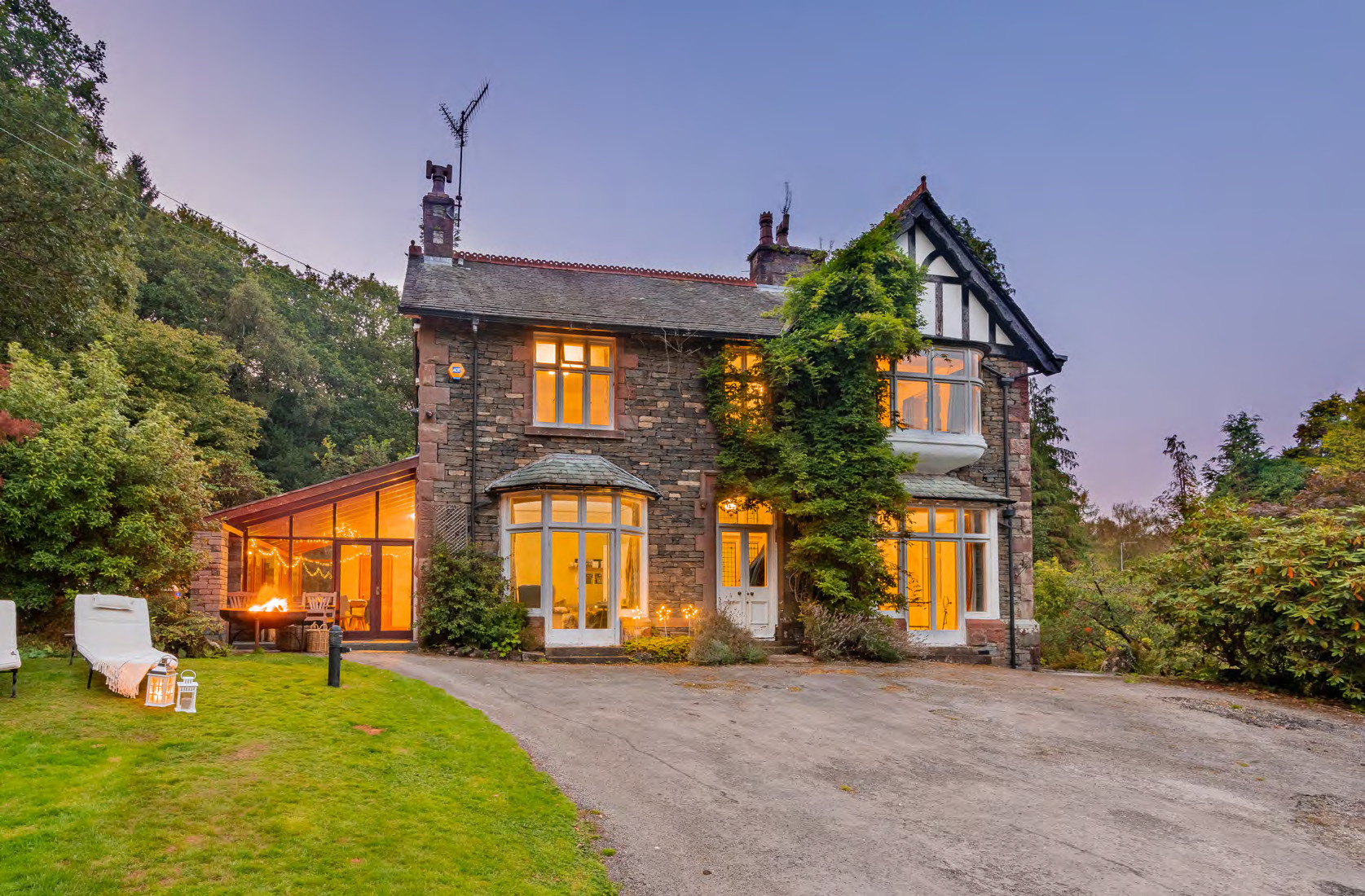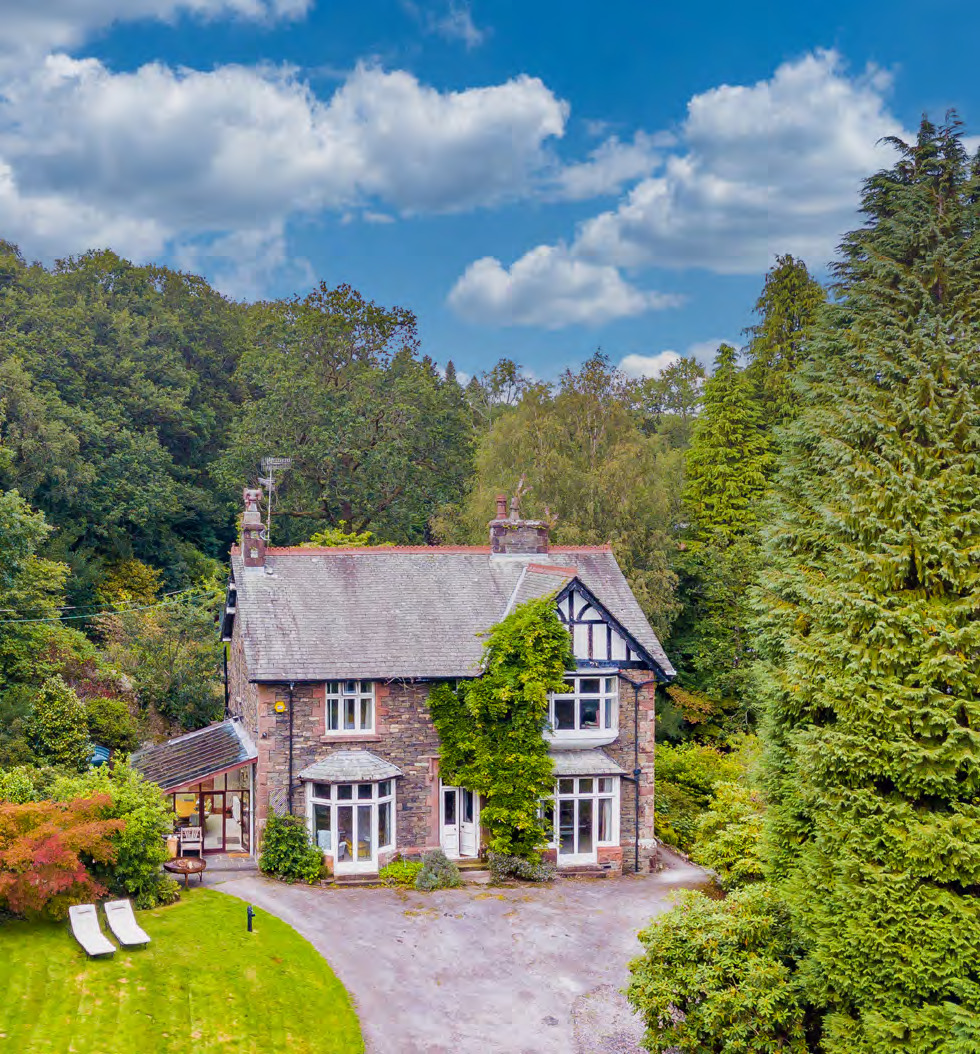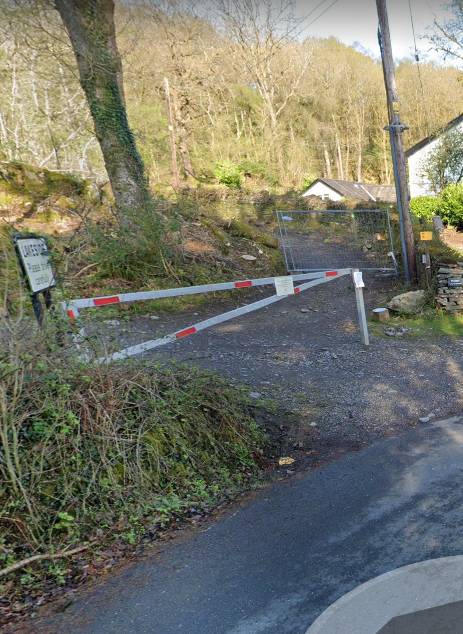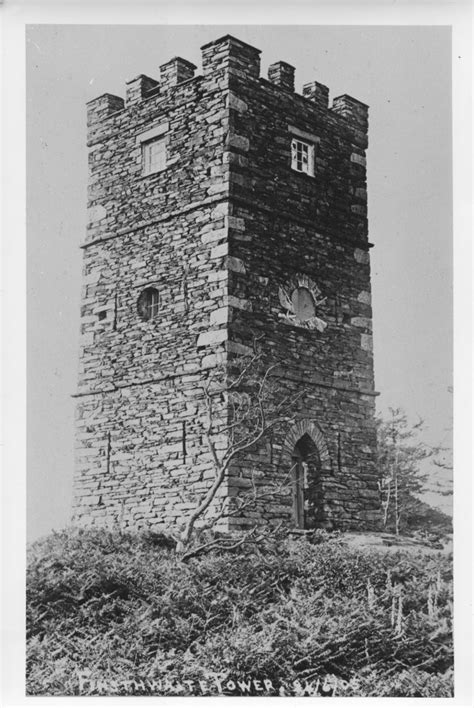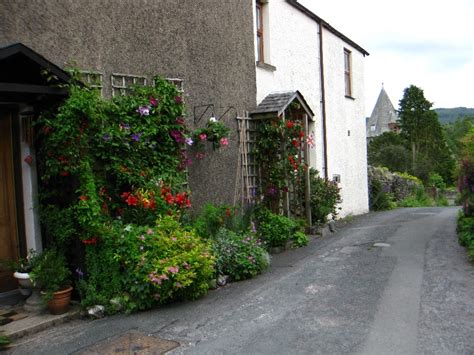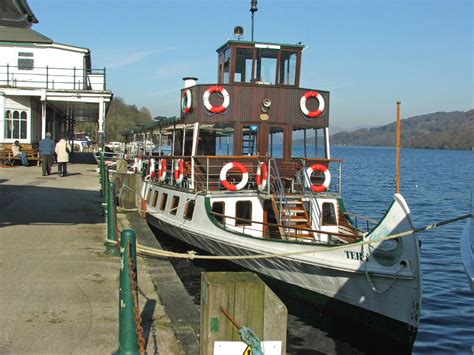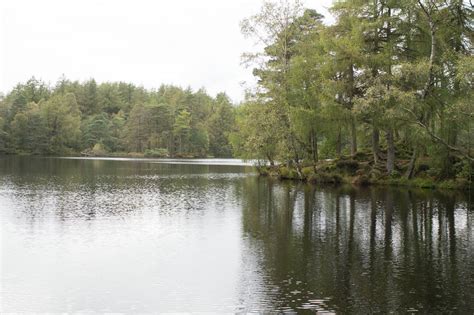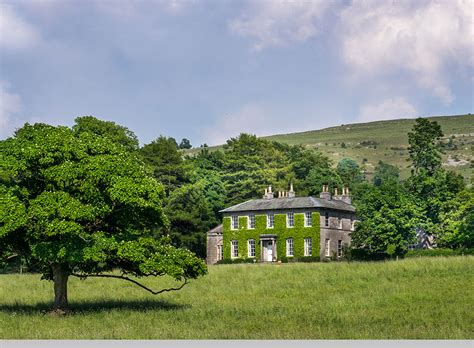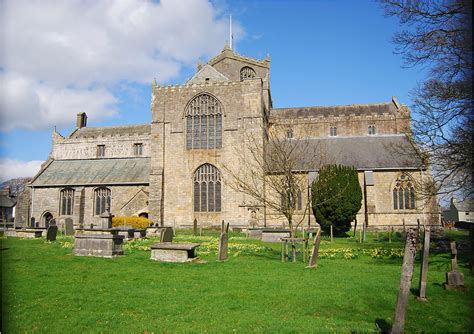When I was nine years old my family moved from Woodhouse Eaves
in Leicestershire up to my grandmother's house, The Croft, at Lakeside, at the
southern end of Lake Windermere. My father had been brought up there.
He loved this place, and I came to love it too. His ashes are scattered
in the clump of trees on the right. The buildings in front of it did not
exist then.
The house was built for a pair of my father's great-aunts.
The extension
on the left replaces what used to be a glass potting shed.
For the retirement of two old ladies it was a generous estate.
Around the house and its gardens were about seventeen acres of
woodland, bought so that nobody could encroach upon the house.
It had three entrances, all on the road from Lakeside to Stott Park
that runs up the west side of the lake. By the main entrance
were stables for a coach and horses, replaced by a subsequent owner
with a double garage, a greenhouse for tomatoes, and
a way into an orchard, which we used as a hen-run. A drive, between
rhododendron bushes and azaleas, led up to the house.
Higher than the house was a rockery, where bilberries, wild
strawberries and heather grew. In front of the house was a massive
tree in a small lawn. Its roots probably went under the house, and
a subsequent owner chopped it down. The second entrance, for tradesmen, ran
straight up from the road to the back door of the house. Between the
main drive and the tradesmen's drive was a kitchen garden, now
landscaped and grassed over. In it was a
raspberry (both red and white) cage, and strawberries, blackcurrants, redcurrants, sorrel, onions, potatoes, carrots, cabbages and herbs of many
varieties. The third entrance, at the back of the house, led through a then uncultivated area of pine trees and daffodils. On the
other side of the road the estate had a bungalow, called the
Tin Tabernacle by my grandmother. This looked out onto a field
running down to the lake. In the middle of the field was a small hut
containing her straw archery targets.
Surrounding house and gardens was woodland, bordered to the south by
the Snake Path, as we called it,
which wound through the woods from Lakeside to the fields
behind the village of Finsthwaite. The picture was evidently taken from what used to be our woodland. The church, St Peter's, has in its cemetery the
grave of Anna Maria Sobieska, wife of Bonnie Prince Charlie, who spent
her remaining days of exile at Jolliver (i.e. July Flower) Tree farm,
out of sight to the left of the picture.
When my friend Jamal Nasrul Islam came to stay at the Croft he played
Tagore tunes on the organ in the church.
Across the Snake Path and through the woods one may come, at the highest point, to a derelict stone tower erected in 1652 to celebrate Blake's victories
over the Dutch. It overlooks Newby Bridge. It had an evil reputation as some
people were killed by lightning there once.
My grandmother "downsized" to the northern half of the Tin Tabernacle,
and her companion and maid (and my father's nursemaid) Ruth Danson to the southern. She was a remarkable character, with a special affinity for
animals, cats in particular. Ruth had once been engaged to be married,
but her fiance had been ordered to drown some kittens, an act which
Ruth could not forgive. Ruth's voice had an extraordinary quality
which I cannot describe and have never heard in another. She did not
look on humankind with favour, our own family excepted.
There followed blissful years for me and my brother Joe. Less blissful
for my father than he had planned, because his job was still in
Leicester, so he had a long and tiring commute by car. He would stay in Leicester during the week and in the Croft at weekends. My mother loved the Croft, and got on well with her mother-in-law, and also with Mrs Ivy
Jenkinson, a lady from Finsthwaite who came to help clean the house.
Ivy was a brilliant cook, and she would sometimes bring an apple pastie
she had just made. Mr Jenkinson was regarded as a scholar in the
village; people would bring their letters to him to read. Her cousin,
Mrs McDougal, was postmistress at Stott Park, just round the corner
from the Croft.
My father bought us an old-fashioned sailing dinghy, which we kept in
a boathouse which could only be accessed via a path through a
neighbour's property. In the attic of the Croft we found an ingenious
boat-hook, whose handle had a broad cobra-like flange at its
business-end, so that if you dropped it in the water it would lie
flat on the surface, easy to retrieve, instead of the heavy hook
sinking. I never saw its like elsewhere. On the other side of the lake,
at the foot of Gummer's How, lived Lady Gowan. Gummer's How was
just over a thousand feet high, and so qualified as a mountain.
Our house is concealed by trees in the centre of view from the
top.
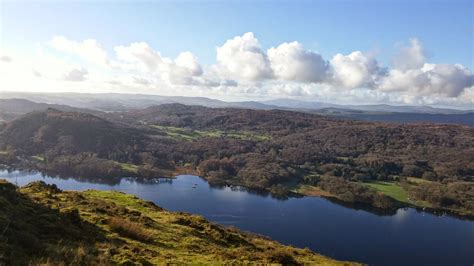
We had a marvellous view of its evening colours from the Croft.
When her children and grand-children came to stay, Lady Gowan would
organize a picnic on Gummer's How, to which we were often invited.
Wood was collected, fires lit, sausages cooked. All very Swallows and
Amazons. She was good at organizing, as her husband had been a district
judge in India, and she accompanied him on horseback when he toured
his circuit. At the Lakeside Women's Institute bridge games she would
have a small bell at hand, to call for silence so that she could
retell her Indian adventures. My mother relished this. In fact Lady
Gowan was extremely kind, and good company. She let me practice
driving her little car before I passed the test. To be driven by
her was a white-knuckle experience as she showed a lamentable lack of mechanical sympathy. She had a neighbour on her side of the lake
called Colonel Sneed, with a daughter called Idonea.
My brother and I each had a bicycle. We kept them in the stables.
Once Joe and I bicycled to Ulverston, about twelve miles away.
My mother put me in charge of my younger brother, but this was
a vain expectation because he was an independent soul, and
he soon lost me in the back streets of Ulverston. Eventually,
I just had to return without him, anxious about what my mother
would say. In fact she was out, I forget where. I remember
sitting in the hayloft of the stables trying to keep calm by
regulating my breathing, as I had learned from a book on Hatha Yoga.
Of course, Joe returned in his own time, and before my mother
got back, much to my relief.
My mother did not drive ("temperamentally unsuited" according
to her driving tester). Various vans came round once a week - a
baker, a butcher, a grocer - which required careful economy by
my mother. We had help with the garden from Harry Conway, a gentle
giant of a man whose main job was to lead a road-mending gang
for the council. He could do anything - dry stone walling, building,
coppicing, lambing. My father gave him my grandmother's half of the
Tin Tabernacle when she died.
The nearest bus service was at Newby Bridge, about two miles to
the south, on the other side of Lakeside. I had permission
from Mr Wren, who owned the farm at Newby Bridge, to leave my bicycle
in one of his barns whenever I took the bus. Wren's farm lay on the
river Leven. Tragically one of his children was found drowned there.
She had slipped on a stone and concussed herself.
Lakeside had a railway station, a terminus of what had once been
the Furness Railway. The station was also a terminus for the steamers
that ran up the lake to Bowness and to Ambleside. When the railway
was running passengers could get straight off the train onto a
steamer, or perhaps go upstairs to the restaurant and throw tidbits
to the gulls from its balcony. The steamers were the responsibility
of Jones the Boat, who lived in Lakeside and owned a Morgan
three-wheeler.
I remember vividly the smell of vegetation, like that of a rain forest,
on the road from Newby Bridge to Lakeside. The westward side was
thickly wooded. There were more open fields on the eastern side,
and in them some old rusting "flying saucers" - farm machinery
perhaps. I imagined that alien creatures had abandoned their
vehicles and were now hiding in the woods, taking note of any
human activity.
The local "poacher" had a beautiful spaniel called "Lady" and a high
squeaky voice. The standard arrangement was that he would poach game
at will, and leave a portion of his take with the landowner as
payment. Thus we came to have rabbits and pheasants for supper
sometimes. Never deer, however. The part of the wood nearest our
orchard had masses of wild garlic, which stank horribly when it
rotted. We once came across a fawn there, no doubt using the stink
to hide its own scent from predators. We were careful not to approach
it, lest its mother become confused.
We had a very healthy outdoor life, going for long walks, rain or shine,
sailing on the lake, or bicycling. I knew every bush and tree in our
own wood, and often in woods that were other people's property. I was
even accomplished at running through the woods in the dark. I never
sustained a scratch.
Above Finsthwaite was an artificial lake
called High Dam, and it was there that I once had an extraordinary
experience while exploring by myself. There was a tree of great
beauty and I was convinced that it had revealed something of
itself to me. It was as if it were a gracious intelligent being, utterly
uninterested in human matters. It sounds daft, and probably was, but
I was thunderstruck by the experience. I felt grateful, and slightly
scared. I could not tell anybody about it, of course.
I had another transcendent, wonderful experience. It was a fine day,
with a cool breeze and little puffy clouds. I was by myself on my bicycle
on the road out of Low Wood going toward Holker Hall. There was no other
traffic. The grasshoppers in the grass verges were loud. The silver
birches in the marshy ground of the estuary to my right seemed out
of a silk-screen painting, and behind them were mountains in the
distance. I realized that I was blissfully happy. My cup was running
over. I felt a profound gratitude for my existence. I knew that this
experience would always be with me, in some sense that I could not
grasp. Later in my life, at university, I had other similar experiences
which I felt were rooted in this one. I treated all of them gingerly,
with reverence, determined to be both rational and open-minded. What
else can one do?
As a child one hears one's parents talking about their own childhood,
without, in my case, really understanding the relationships. Only
later in my life did I appreciate my father's background.
His mother
had been brought up at Longlands, a beautiful estate outside Cartmel.
Her mother, my father's grandmother, Louisa Augusta, was rather pious,
and taught Sunday school at Cartmel Priory. The south window in the
Priory was a gift of her family, the Barkers. Unfortunately my
great-grandmother was also very puritan, and believed that enjoyment
of any kind was wicked, so perhaps it is not surprising that her
husband, John Barker, took to drink. A family joke is that he would
ring the bell for his servant and then say in lordly tones
Bring me all those things that I require. The Barkers had made their money
from a gunpowder factory in Low Wood, charcoal being a substance
produced in abundance by coppicing the woods in the locality.
My father's father had doubtless been chosen as a suitable son-in-law by the Barkers because his father, George Henry Wraith, had been
three times mayor of Spennymoor and once its member of Parliament, and had founded the Alderman Wraith Grammar School there. Alas, this
respectability had concealed an unreliability with money, and after
siring three children he was persuaded to decamp to South Africa with a pension, on condition he should not return. My father's sister, Maria,
once showed me a drawing made by her mother of my grandfather
expatiating on the virtues of Tiptree's marmalade. He swore it was the
only marmalade he could eat, but unknown to him his wife had decanted
a quite ordinary brand into a Tiptree's jar which she had put aside for that purpose.
